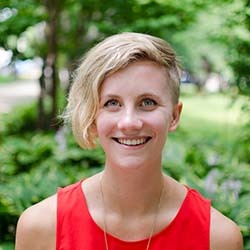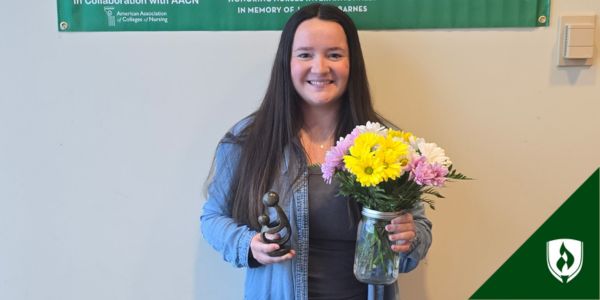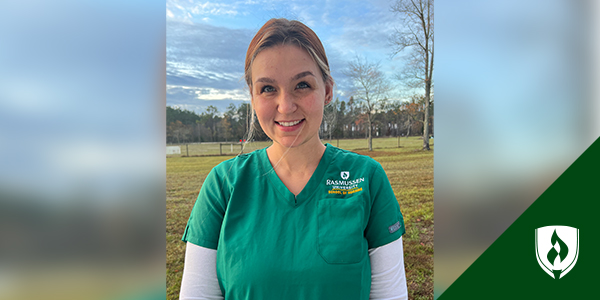Kayla Schramm first discovered her passion for early childhood education when she began bringing her now stepson, Derek, to childcare. From her experiences she became driven to make a lasting impact on early childhood education. She wanted to make a positive change for young learners and improve childcare at a systematic level. These realizations are what solidified her dream of becoming a director of a childcare center.
The first step in Schramm’s early childhood education pursuit was with Rasmussen College. When she was 18 she started working at KinderCare, a daycare center for young children. While she was working, KinderCare had an alliance with Rasmussen College and offered its employees the opportunity to earn their Child Development Associate (CDA) Credential at a discounted rate.
Schramm knew this was only the beginning of her educational journey and began looking into programs for early childhood education. “When I decided to get my Associate’s, I decided to go back to Rasmussen because I liked their structure,” Schramm reflects. “And I liked that the College offered an online program because it worked with my schedule.”
Rasmussen College’s online Early Childhood Education (ECE) Associate’s degree program allowed Schramm to continue working while going to school, something that was important to her and essential to her family.1 A month prior to starting the program, Schramm had taken a new position working at Head Start with their birth to three year-old age group. She explains how her own beliefs in early childhood education parallel that of Head Start’s mission—to promote the school-readiness of young children from low-income families by enhancing their cognitive, social and emotional development.
“My goal is to help prepare children to give them a head start. So, the more I learn the better I can do that for them,” Schramm says. “Early childhood is one of the most important times in your life and people don’t realize that getting a head start now will help them be able to be self-sufficient later on. I just want to help future generations get out of poverty.”
When starting at Rasmussen College, Schramm applied through Head Start for a T.E.A.C.H. scholarship. T.E.A.C.H. is a program that provides scholarships to individuals pursuing early childhood care and education programs. Schramm is grateful to have been awarded the scholarship. The scholarship program not only helps her financially but it also gives her the flexibility to dedicate five hours out of her work week schedule to complete her coursework.
In February 2019, Schramm graduated from Rasmussen College with her ECE Associate’s degree. She was proud of her accomplishment, but knew she was going to continue with her education well past her Associate’s degree.
When looking into Bachelor’s degree programs, it was essential to Schramm that she was choosing the best option for herself and her family. “Rasmussen had the most flexible and fast-paced option for someone with a family lifestyle,” she says.
So, just a month after graduating with her Associate’s degree, Schramm began the Rasmussen College ECE Bachelor’s degree program. Since starting the Bachelor’s program, she has felt her courses have complimented her work at Head Start. There are parallels between what she is studying and what she is actually seeing with her young learners. “It feels more relevant,” Schramm states. “I am learning about something and then I go to work and I’m like, ‘Yes, I see that!’”
Schramm knows she made the right decision choosing to continue her education with Rasmussen College, because while busy with school, she has also been able to play an active role in her stepson Derek’s life. Currently, she is the Parent Teacher Association (PTA) President for Derek’s school, baseball team mom who coordinates sporting events for players and parents, and a hockey mom who picks up and drops off Derek at practices. Schramm chuckles when explaining her only real day off is Sunday and that day is dedicated to her coursework.
Throughout her busy work week she is grateful for nap time at Head Start so she can check in on her courses. Schramm knows the ECE program’s online flexibility has made it possible for her to continue working, stay highly involved in Derek’s life and still excel in her courses. Schramm maintained a 3.99 GPA in her Associate’s degree program and hopes to match it in her Bachelor’s program as well.
Doing well in her courses translates to being better with the young learners in her care. Five months after beginning her Bachelor’s degree program, she was promoted to working with the three to four year-old age group at Head Start. This age group provides her with the opportunity to teach and build skills with children, something that wasn’t as prevalent in her work with the younger kids at Head Start.
“I needed my Associate’s to work with this age group. So basically, with each degree I get, it unlocks a new area for me,” Schramm states.
The next step to achieve her goal of becoming a childcare center director is to become an early educator specialist. For this, she will need to complete her Bachelor’s degree. Schramm plans to graduate with that degree in late 2020.
“Rasmussen is making me better and allowing me to pursue childcare at higher and higher levels,” Schramm states. “And that’s what I want to do.”
1Graduates of Early Childhood Education programs at Rasmussen College are not eligible for licensure as a teacher in an elementary or secondary school. A Bachelor’s degree and a state teaching license are typically required to work as a teacher in a public school and some private school settings. States, municipalities, districts or individual schools may have more stringent licensing requirements. Students must determine the licensure requirements in the state and school in which they intend to work. Childcare facilities and the states in which they are located establish qualifications for staff who work with children, and often implement guidelines regarding age, education, experience and professional development. Students must determine the licensure requirements for the state and facilities in which they work. This program has not been approved by any state professional licensing body, and this program is not intended to lead to any state-issued professional license. For further information on professional licensing requirements, please contact the appropriate board or agency in your state of residence.






